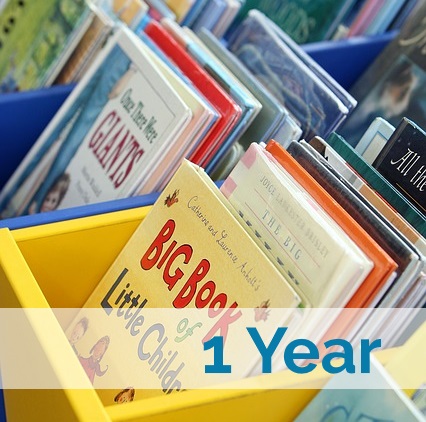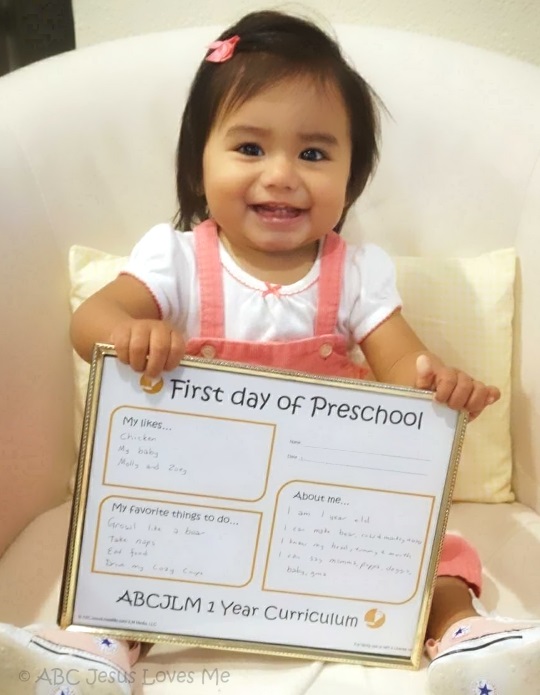
Get ready to discover the best books for 1-year-olds! Selected for their rich literacy, these books are the perfect length for toddlers, expanding their vocabulary and nurturing a love for reading.
With timeless appeal, these delightful reads are at the heart of the 1 Year Preschool Curriculum, chosen to enhance the themes and learning objectives. You'll enjoy the fun activities in the Lesson Plans which bring the stories to life and spark even more learning adventures!
Tap to download the Best Books for 1-Year-Olds list here. Be sure to scroll to the bottom of this page for additional age-specific reading lists.
For easy ordering, you can also view the 1 Year Curriculum Book List on Amazon.
In Week 1 of the 1 Year Curriculum, the child will be introduced to a Naming Book. While there are many choices, My Little Word Book is one of my favorites. Follow the child's lead by naming the items over and over. With time, the child will be able to point to the items you ask for and eventually name them on their own. Learn how to use naming books effectively by watching the How to Grow a Reader video.
Brown Bear, Brown Bear, What Do You See? by Bill Martin Jr. and Eric Carle uses repetition to help the child name animals, mimic their sounds, and join in on the familiar repeating phrases.

Begin now guiding your toddler’s learning with the ABCJesusLovesMe 1 Year Curriculum. With easy-to-follow lesson plans, you’ll discover age-appropriate activities that build a strong foundation in academics, Bible stories, and developmental skills. Perfect for home or preschool, this curriculum keeps children ages 12-24 months engaged and having fun while learning!
When the Elephant Walks by Keiko Kasza is a charming, circular story about a chain of animals fleeing in a sequence of cause-and-effect. The elephant's walk scares a bear, which in turn frightens other animals, down to the smallest mouse. The book ends on a playful note, with the mouse scaring the elephant, bringing the story full circle. The repetitive pattern and gentle illustrations make it fun for young children to follow along.
Big Red Barn by Margaret Wise Brown is a soothing, rhythmic story that describes the daily activities of animals on a farm. Set against the backdrop of a big red barn, the animals play and interact during the day and settle down to sleep as night falls.
Old MacDonald Had a Farm by various authors is a classic nursery rhyme that introduces children to various farm animals and the sounds they make. As you sing along or speak the words, each verse features a different animal, and children can join in by making the animal sounds. It's a fun and interactive way to help little ones learn about animals while encouraging participation and language development.
Help your little ones learn their colors with these vibrant, fun flashcards—perfect for preschoolers! Click the link below to download your free set today and start learning through play.
Pat the Bunny by Dorothy Kunhardt is a beloved interactive book for babies and toddlers. It features simple text alongside touch-and-feel activities, like patting a bunny's fur, playing peek-a-boo, or feeling Daddy’s scratchy face. The sensory experiences in the book encourage exploration and engage young readers, making it a classic introduction to books for the very young.
Barnyard Dance by Sandra Boynton is a Franz family favorite! A lively, rhythmic board book, children are invited to join in the fun of a barnyard dance. With its catchy, rhyming text and playful illustrations, the animals—such as cows, pigs, and chickens—take turns dancing to a cheerful beat. The interactive, upbeat tone encourages children to clap, stomp, and move along with the animals, making it a fun and engaging read.
Three Little Kittens is a classic nursery rhyme that tells the story of three kittens who lose their mittens and must search for them. Each verse follows the kittens' journey as they try to find their lost mittens, with playful language and repetitive patterns. The story's simple, rhythmic text and charming illustrations make it an enjoyable read for young children while reinforcing concepts like responsibility and rhyme.
Does a Kangaroo Have a Mother, Too? by Eric Carle is a delightful story that explores the idea of animal motherhood. The book asks children whether different animals, like a kangaroo, elephant, or penguin, have mothers, just like they do. The rhythmic text and vibrant illustrations engage children while teaching them about various animals and the concept of family in the animal kingdom.
Dear Zoo by Rod Campbell is a classic lift-the-flap book where a child writes to the zoo asking for a pet. The zoo sends a series of animals, each one unsuitable for a pet, until the perfect animal—a cute little puppy—is found. The repetitive text and engaging flaps make this a fun and interactive way to introduce children to animal names and sounds.
The classic Goodnight Moon by Margaret Wise Brown is a beloved bedtime story that features a little bunny saying goodnight to various objects in his room, including the moon, stars, and a red balloon. The rhythmic, soothing text and gentle illustrations make it a perfect bedtime read, offering a calming and repetitive structure that helps young children wind down for the night.
Five Little Ducks, available by multiple authors, is a popular counting rhyme that follows a mother duck as she calls her five little ducks to come home, but one by one, they wander off in different directions. As each duck disappears, the rhyme counts down until there are none left, and the mother duck is left calling for her little ones to return. This playful, rhythmic story is a great way to introduce counting and subtraction to young children while reinforcing the sounds and actions of the ducks.
Join us for a heart-to-heart with friends who truly get your parenting journey. Col-hosted by Heidi Franz, creator of ABCJesusLovesMe, this podcast provides a cozy, supportive space for practical advice, shared experiences, and heartfelt encouragement. Tune in on your favorite app or right here on the web!
Owl Babies by Martin Waddell tells the story of three baby owls—Sarah, Percy, and Bill—who wake up to find their mother has gone missing. As they anxiously wait for her return, they comfort each other with repeated reassurances until she finally returns.
The Three Little Pigs is a classic folktale that has been retold by various authors, each adding their own unique twist. The story follows three pigs who each build a house—one of straw, one of sticks, and one of bricks—to protect themselves from a hungry wolf. As the wolf blows down the first two houses, the third pig’s brick house withstands the huffing and puffing. This timeless tale teaches lessons about hard work, perseverance, and the consequences of taking shortcuts.
My kiddos loved Mr. Brown Can Moo! Can You? by Dr. Seuss! This fun and engaging book introduces children to various animal sounds and actions. Through rhythmic, playful text, Mr. Brown makes a series of sounds, from a moo to a buzz and invites readers to mimic them.
Moo, Baa, La La La! by Sandra Boynton is a cheerful and humorous board book that introduces young children to the sounds animals make. With simple text and lively illustrations, the book features a variety of animals, including cows, sheep, and ducks, all making their signature sounds. The repetitive, playful nature of the book makes it a fun read for toddlers, helping them develop language skills and an understanding of animal sounds.
Guess How Much I Love You by Sam McBratney tells the heartwarming story of Little Nutbrown Hare and Big Nutbrown Hare as they express their love for each other in increasingly expansive ways. The two hares compare their love to various natural elements, such as the height of the trees and the depth of the river, until Little Nutbrown Hare asks, "Guess how much I love you?" This book still gets me deeply.
From Head to Toe by Eric Carle is an interactive, engaging book where animals demonstrate various movements, such as a giraffe bending its neck or a monkey wiggling its hips, encouraging young readers to follow along.
Help your little one develop a love for books with a curated list of the best toddler books and expert tips that make storytime fun and educational. This free packet offers practical advice on engaging your child, nurturing a love of reading, and building important skills, making reading to your toddler one of the most valuable gifts you can give them!
The Very Busy Spider by Eric Carle tells the story of a spider who works tirelessly to spin her web, despite being distracted by various animals offering to play. As each animal approaches and asks her to join in their activities, the spider continues her work, demonstrating focus and perseverance.
Five Little Speckled Frogs is a popular counting song and story that has been illustrated by various artists. The story features five frogs sitting on a speckled log, eating some most delicious bugs. One by one, each frog jumps off the log into the water, and the count decreases, helping children practice subtraction and counting. With its catchy, repetitive lyrics and vibrant illustrations, this story is a fun and educational way for young children to learn numbers and enjoy the playful antics of the frogs.
How Do Dinosaurs Say Good Night? by Jane Yolen and Mark Teague is a playful story that imagines how different dinosaurs might behave at bedtime. The dinosaurs are shown in various bedtime scenarios, sometimes being rowdy and stubborn, but ultimately settling down to say goodnight in a loving, affectionate way. With its humorous illustrations and rhythmic, repetitive text, this book is a fun way to help children transition to bedtime while also teaching manners and the importance of routines.
Giraffes Can't Dance by Giles Andreae tells the story of Gerald the giraffe, who struggles to dance because of his long legs and clumsy movements. Feeling discouraged, he almost gives up, but with encouragement from a friendly cricket, Gerald learns to dance in his own unique way to the rhythm of the jungle.
Llama Llama Red Pajama by Anna Dewdney is a charming story about a little llama who is ready for bed and calls out for his mama, but she doesn’t immediately come to his side. As Llama Llama grows more anxious and cries for his mama, he eventually learns that she is simply downstairs and will be back to tuck him in. This sweet, rhythmic book addresses feelings of separation anxiety and impatience in young children while reinforcing the reassurance of a loving, dependable caregiver.
The Very Hungry Caterpillar by Eric Carle follows the journey of a small caterpillar as he eats his way through a variety of foods over a week's time. Starting with one apple and gradually increasing his intake, the caterpillar's appetite grows until he transforms into a beautiful butterfly. This classic story contains repetitive text, a focus on counting, days of the week, and the life cycle of a butterfly.